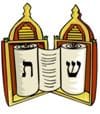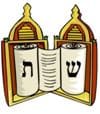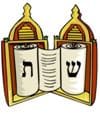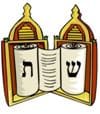******
See below Times for Tisha BeAv

*****
לוח זמני תפלה לקיץ תשפ״ד
Summer Timetable 5784 – 2024
מוצאי שבת | ערבית )מוצ”ש( | שקיעה | סוף זמן קראת שמע | זמן שבת | פלג מנחה (תה״ד) | פלג מנחה (לבוש) | מנחה וקבלת שבת | תאריך | שבת פרשת |
Shabbat Ends | Arbit | Sunset | Shema to be read before | Candles to be |
| Earliest Candle lighting | Minha & Kabbalat Shabbat* | Date | Parasha |
PM | PM | PM | AM | PM | PM | PM | PM |
|
|
9:45 | 9:41 | 8:45 | 9:27 | 8:34 | 7:50 | 7:15 | 7:00 | 9/10 Aug | דברים (שבת חזון) |
For those not in the Bet Hakeneset, but wishing to bring in Shabbat with the Kahal, candles should be lit about 30 minutes after the time listed for Minha and Kabbalat Shabbat, unless the time listed in the ‘latest candle lighting’ column is earlier, when candles MUST be lit by that time, in all cases
שבת
קרבנות
9:00 am
הודו
9:15 am
מנחה
6:30 pm
*******
6:40 pm
*********
This Torah portion begins the last of the Five Books of The Torah, Sefer Devarim. This Book is also called Mishneh Torah, “Repetition of the Torah” (hence the Greek/English title “Deuteronomy”). Sefer Devarim relates what Moshe told the Jewish People during the last five weeks of his life, as they prepared to cross the Jordan River into the Land of Israel. Moshe reviews the mitzvahs with the people, stressing the change of lifestyle they are about to undergo — from the supernatural existence of the desert under Moshe’s guidance, to the apparently natural life they will experience under Yehoshua’s leadership in the Land.
The central theme this week is the sin of the spies, the meraglim. This Torah portion opens with Moshe alluding to the sins of the previous generation who died in the desert. He describes what would have happened if they had not sinned by sending spies into Eretz Yisrael. Hashem would have given them, without a fight, all the land from the Mediterranean to the Euphrates, including the lands of Ammon, Moav and Edom.
Moshe details the subtle sins that culminate in the sin of the spies, and reviews at length this incident and its results. The entire generation would die in the desert and Moshe would not enter Eretz Yisrael. He reminds them that their immediate reaction to Hashem’s decree was to want to “go up and fight” to redress the sin. He recounts how they would not listen when he told them not to go, and that they no longer merited vanquishing their enemies miraculously. They had ignored him and suffered a massive defeat. They were not allowed to fight with the kingdoms of Esav, Moav or Ammon. These lands were not to be part of the map of Eretz Yisrael in the meantime. When the conquest of Canaan will begin with Sichon and Og, it will be via natural warfare.
Ohr Somayach Institutions www.ohr.edu
דינים השייכים ליום תשעה באב
תשעה באב אסור
בחמישה דברים. אכילה ושתיה, רחיצה, וסיכה (סיכה פירושה לסוך את הגוף בשמן, או
למרוח קרם גוף וכדומה), נעילת מנעלי עור, ותשמיש המיטה. וכן אסרו חכמים ללמוד תורה
ביום תשעה באב, לפי שדברי תורה משמחים את הלב. ואין לעסוק אלא בספר איוב, ובנבואות
החורבן שבספר ירמיה, וכן במדרשים השייכים לחורבן, ובהלכות אבילות וכיוצא בזה. וכן
מותר ללמוד בספרי מוסר המעוררים את האדם לשוב בתשובה ולהטיב את מעשיו.
ואין
אוכלים בערב תשעה באב, אלא עד סמוך לשקיעת החמה. ומשקיעת החמה חלה חובת חמישה
עינוים אלו שהזכרנו.
אסור
לרחוץ במים בתשעה באב, בין במים חמים בין במים צוננים, בין כל גופו בין מקצת גופו,
ואפילו להושיט אצבעו במים אסור. לפיכך, ביום תשעה באב בבוקר, יטול ידיו עד
קשרי אצבעותיו בלבד (דהיינו שישים מים רק עד מקום חיבור האצבעות לכף היד), ונוטל
שלוש פעמים לסירוגין כדרך שנוטלים כל השנה, ויברך על נטילת ידים. וכן ינהג כשיוצא
מבית הכסא, שיטול ידיו רק עד קשרי אצבעותיו.
לא
ירחץ פניו בתשעה באב בבוקר, אלא לאחר שינגב ידיו, כשהן עוד לחות, יעבירם על גבי
עיניו, ואם יש לו לפלוף ליד עיניו, או לכלוך אחר, מותר לרחוץ
המקום המלוכלך. ומי שהוא מקפיד על נקיותו, ואין דעתו מיושבת עליו כשאינו רוחץ את
פניו בבוקר, מותר לו לרחוץ את פניו בבוקר תשעה באב.
כלה,
כל שלושים יום מיום חתונתה, מותרת לרחוץ את פניה במים, כדי שלא תתגנה על בעלה.
בהלכות
שבעה עשר בתמוז הזכרנו,
שמי
שהדבר קשה לו מאד להמנע מצחצוח שיניים ביום התענית בבוקר, רשאי להקל לצחצח את
שיניו, באופן שיזהר לבל יבלע שום טיפת מים, וכן יזהר שלא יכניס לפיו שיעור רביעית
מים (שמונים ואחת מ”ל מים) בבת אחת. אולם בתשעה באב אין להקל בזה, אלא אם כן
יש לו צער גדול בלי זה, או שסובל מריח רע מפיו, שאז יכול להקל בזה בתנאי נוסף,
שיזהר מאד להוריד את פיו למטה, כדי שלא יבואו המים לגרונו. (וביום הכפורים אין
להקל בדבר)
Laws Pertaining to Tisha Be'av (The Ninth of Av)
prohibited on Tisha Be'av: Eating and drinking, washing (one's self), rubbing
one's body with oils or body lotions, wearing leather shoes, and marital
relations. Our Sages also prohibited learning Torah on Tisha Be'av, for the
words of Torah gladden the heart. The only portions of Torah that one may delve
into are the book of Iyov (Job), the prophecies regarding the destruction of
the Temple in the book of Yirmiya (Jeremiah), the Midrashim regarding the
destruction of the Temple, the laws of mourning, and the like. One may likewise
learn Mussar works which arouse one to repent and better his deeds.
categories of abstinence we have mentioned above take affect beginning from
sunset.
entire body or just partially. One may not even stick his finger into water.
Thus, on the morning of Tisha Be'av, one should wash his hands only until his
knuckles the way he washes the rest of the year, i.e. three times on each hand
while switching off hands, and recite the blessing of “Al
Netilat Yadayim.”
After one uses the restroom, he should wash his hands the same way, only until
his knuckles.
washes his hands, before he dries them while they are still wet; he may brush
them over his eyes. If one has eye residue or any other filth in or around his
eyes, one may wash the dirty area. If one is extremely concerned about his
personal hygiene and does not feel at ease with himself if he does not wash his
face in the morning, he may indeed wash his face on the morning of Tisha Be'av.
the morning of Tisha Be'av so that she does not become repulsive to her
husband.
if it is extremely difficult for one to abstain from brushing his teeth on the
morning of the fast, he may be lenient and brush his teeth while taking care
not to swallow even a drop of water. Additionally, one must take care not to
put a “Revi'it” (81 ml, approximately 2.7 oz.) of water into his
mouth at once. Nevertheless, on Tisha Be'av one should not be lenient to do
this unless one suffers immensely without doing so or if one suffers from bad
breath, in which case one may be lenient on condition that one tilt his mouth
downwards, in order that the water not reach his throat (in addition to the
aforementioned conditions). One should not rely on this leniency on Yom Kippur
though
מוצאי שבת | ערבית )מוצ”ש( | שקיעה | סוף זמן קראת שמע | זמן שבת | פלג מנחה (תה״ד) | פלג מנחה (לבוש) | מנחה וקבלת שבת | תאריך | שבת פרשת |
Shabbat Ends | Arbit | Sunset | Shema to be read before | Candles to be |
| Earliest Candle lighting | Minha & Kabbalat Shabbat* | Date | Parasha |
PM | PM | PM | AM | PM | PM | PM | PM |
|
|
9:28 | 9:24 | 8:31 | 9:32 | 8:19 | 7:36 | 7:03 | 6:45 | 16/17 Aug | ואתחנן (שבת נחמו) |
מוצאי שבת | ערבית )מוצ”ש( | שקיעה | סוף זמן קראת שמע | זמן שבת | פלג מנחה (תה״ד) | פלג מנחה (לבוש) | מנחה וקבלת שבת | תאריך | שבת פרשת |
Shabbat Ends | Arbit | Sunset | Shema to be read before | Candles to be |
| Earliest Candle lighting | Minha & Kabbalat Shabbat* | Date | Parasha |
PM | PM | PM | AM | PM | PM | PM | PM |
|
|
9:10 | 9:06 | 8:15 | 9:37 | 8:03 | 7:22 | 6:50 | 6:40 | 23/24 Aug | עקב |
מוצאי שבת | ערבית )מוצ”ש( | שקיעה | סוף זמן קראת שמע | זמן שבת | פלג מנחה (תה״ד) | פלג מנחה (לבוש) | מנחה וקבלת שבת | תאריך | שבת פרשת |
Shabbat Ends | Arbit | Sunset | Shema to be read before | Candles to be |
| Earliest Candle lighting | Minha & Kabbalat Shabbat* | Date | Parasha |
PM | PM | PM | AM | PM | PM | PM | PM |
|
|
8:52 | 8:48 | 7:59 | 9:42 | 7:47 | 7:08 | 6:37 | 6:40 | 30/31 Aug | ראה (ש''מ) |
מוצאי שבת | ערבית )מוצ”ש( | שקיעה | סוף זמן קראת שמע | זמן שבת | פלג מנחה (תה״ד) | פלג מנחה (לבוש) | מנחה וקבלת שבת | תאריך | שבת פרשת |
Shabbat Ends | Arbit | Sunset | Shema to be read before | Candles to be |
| Earliest Candle lighting | Minha & Kabbalat Shabbat* | Date | Parasha |
PM | PM | PM | AM | PM | PM | PM | PM |
|
|
8:34 | 8:30 | 7:42 | 9:47 | 7:30 | 6:54 | 6:23 | 6:40 | 6/7 Sep | שופטים |
























































